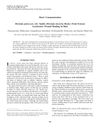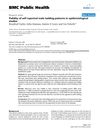 35 citations,
December 2006 in “Journal of medicinal food”
35 citations,
December 2006 in “Journal of medicinal food” Morinda pubescens fruit extract helps wounds heal faster in rats.
 35 citations,
November 1931 in “Journal of Genetics”
35 citations,
November 1931 in “Journal of Genetics” Hairless mice lack fur due to a genetic mutation affecting skin response, not hormone issues.
 34 citations,
December 2015 in “Neuroscience & Biobehavioral Reviews”
34 citations,
December 2015 in “Neuroscience & Biobehavioral Reviews” Some hormone-related drugs may protect brain cells in Parkinson's disease differently in men and women.
 34 citations,
February 2012 in “Journal of Cutaneous Pathology”
34 citations,
February 2012 in “Journal of Cutaneous Pathology” The research found specific signs to diagnose alopecia areata incognito and noted patients generally regrow hair after steroid treatment.
 33 citations,
December 2004 in “Differentiation”
33 citations,
December 2004 in “Differentiation” Mouse amnion can turn into skin and hair follicles with help from certain cells and factors.
 32 citations,
September 2018 in “Clinical Obstetrics and Gynecology”
32 citations,
September 2018 in “Clinical Obstetrics and Gynecology” Hormone therapy for transgender females increases the risk of blood clots and requires careful dosing, monitoring, and lifelong management.
 32 citations,
June 2013 in “Journal of Investigative Dermatology”
32 citations,
June 2013 in “Journal of Investigative Dermatology” Mice without certain skin proteins had abnormal skin and hair development.
 32 citations,
December 2004 in “BMC Public Health”
32 citations,
December 2004 in “BMC Public Health” Men can report their own balding patterns well enough for large health studies.
 31 citations,
May 2008 in “Drug Discovery Today: Disease Mechanisms”
31 citations,
May 2008 in “Drug Discovery Today: Disease Mechanisms” Different hair growth problems are caused by genetic issues or changes in hair growth cycles, and new treatments are being developed.
 31 citations,
September 2006 in “International journal of gynaecology and obstetrics”
31 citations,
September 2006 in “International journal of gynaecology and obstetrics” New treatments for PCOS focus on insulin resistance and reducing testosterone levels, along with traditional hormone therapies.










